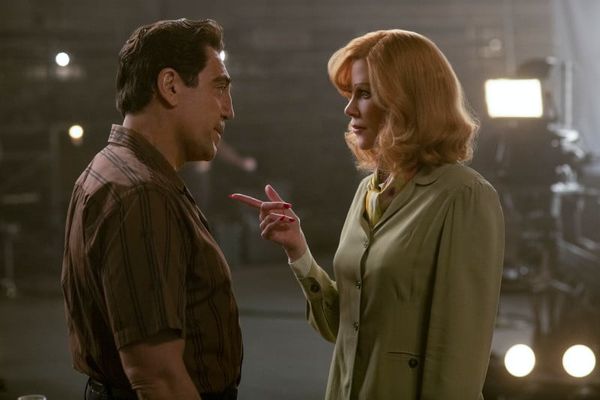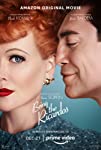Eye For Film >> Movies >> Being The Ricardos (2021) Film Review
Being The Ricardos
Reviewed by: Amber Wilkinson

If the relationship at the heart of biopic snapshot Being The Ricardos - between Nicole Kidman's Lucille Ball and Javier Bardem's Desi Arnaz - is a rocky one, the same cannot be said of the marriage between Aaron Sorkin's scriptwriting and Ball's quick-witted humour, which is one made in heaven. The writer, also directing here, has come under fire a lot in the past for his writing of female characters, a criticism he avoided adding to with 2020s The Trial Of The Chicago 7 by dint of its virtual all-male cast, but he has a ball with Ball and her cohorts, serving up dialogue as sharp and springy as an elastic band snapped against a wrist.
As with the Chicago 7, the truth is in here somewhere, but it's served up Sorkin style, so that he takes different events from Ball and Arnaz's marriage - an accusation of Communist activity, a gossip magazine revelation of a potential affair by Arnaz and an announcement that Ball is pregnant - and puts them into the pressure cooker of a single week on the set as they prepare for an episode of the second season of the show in 1952. He also employs a clever framing device, which sees the, now much older, writers, reminisce about the show, which allows him to dip in and out of the past without being too jarring. A further strategy takes us into the mind of Ball as, at intervals, she imagines how scenes of the show will play out, scenes rendered by Sorkin in black and white.

This might sound like a lot of mechanics but the pieces fit together surprisingly well thanks to Sorkin's breezy dialogue, which keeps us with Ball as she tries to navigate her personal problems while still keeping her show on top. While it's hard to completely lose yourself in Kidman's performance, simply because she is such a well known actress in her own right, she is helped by Sorkin introducing both her and Arnaz from the feet up, so that we can briefly appreciate both her and Bardem's voice work without the conflict of recognising the actors beneath the make-up.
Not only does she get the tone of Ball right, Kidman also captures the comedy star's forthright energy, an essential fearlessness and truthfulness about herself that Sorkin also evidently admires. Whether it's her refusal to lie about why she "ticked a box" or her persistence in trying to make a scene more funny in the face of opposition from her executive producer Jess Oppenheimer (Tony Hale), she never opts for taking the easy way out. Even if you're no fan of the original series - something Sorkin nods to in a conversation between Ball and the lone woman writer Madelyn Pugh (Alia Shawkat) - you'll be hard pressed not to fall for Kidman's portrayal of a woman who knew and wasn't afraid to speak her mind.
Bardem is solid in support as the Cuban Arnaz, the energy between he and Ball fizzy and believable, although as you might expect, Sorkin gives Ball all the best lines - even finding room for the most unexpected jump scare I've seen on film in a long time. Character is key, however, and there's a palpable sense of Ball being torn about believing Arnaz and her anxiety about her ability to create a sort of "home" with him onset that she can't manufacture off, but Sorkin never belittles her, treating both her talent and her troubles with seriousness beneath the surface laughs. He also spares more than a thought for her co-star Vivian Vance (Nina Ariadna), who is struggling with being stuck in the role of dowdy Ethel, giving Ariadna plenty to work with as Vivian spars with her grumpy older co-star William Frawley (JK Simmons).
Although Sorkin, as a director, struggled with the bigger crowd scenes in Chicago 7, here he's back on much firmer ground, within the goldfish bowl of the writers' room environment, and the studio stage, that though historic examples of type, must strike a chord with his own experience on television shows.
Some of the production values are on the weak side, particularly the lighting, which is oddly muted, given that films made for streaming services are generally overlit if anything - and there is something very odd about Ball's hair colour, which moves between pure ginger and something much more auburn seemingly on a whim. You may not completely love Lucy by the end of it but you will get a sense of what it was like to be a woman like her in that particular era - which is just as impressive an accomplishment.
Reviewed on: 08 Jan 2022
















